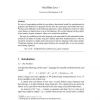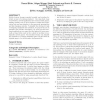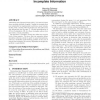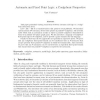112 search results - page 13 / 23 » Game semantics for first-order logic |
118
click to vote
APAL
2008
15 years 27 days ago
2008
We solve a longstanding problem by providing a denotational model for nondeterministic programs that identifies two programs iff they have the same range of possible behaviours. W...
95
Voted
MHCI
2009
Springer
15 years 7 months ago
2009
Springer
Mobile devices became powerful recently and wireless Internet access is becoming standard. One important class of networked, mobile applications are location based games, making e...
98
Voted
ATAL
2010
Springer
15 years 1 months ago
2010
Springer
Alternating-time Temporal Logic (ATL) [1] is used to reason about strategic abilities of agents. Aiming at strategies that can realistically be implemented in software, many varia...
109
Voted
SKG
2006
IEEE
15 years 6 months ago
2006
IEEE
Semantic completeness and syntax completeness are important characters of the general formal systems, two the completeness have different meaning for a formal system. This paper a...
84
Voted
IANDC
2006
15 years 24 days ago
2006
This paper generalizes existing connections between automata and logic to a coalgestraction level. Let F : Set Set be a standard functor that preserves weak pullbacks. We introdu...




